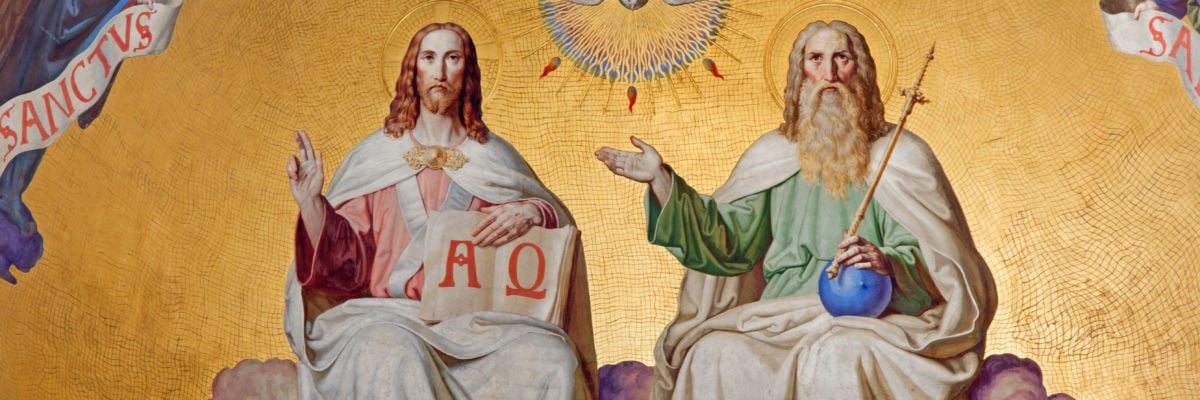
Tim Staples responds to the Mormon claim that there is more than one God. He goes back to Genesis for evidence of the Christian belief that there is only one God in the Trinity.
Transcript:
How would you present your best argument to a very short-answered Mormon scholar that monotheism didn’t come after polytheism and that there’s only one God?
Well, first of all, monotheism came before polytheism because, of course, our first parents understood that there is one God. Now,
I know the argument from some Mormons they would say that that’s not true, but that’s certainly the record of the Bible.
But be that as it may, you say, “What would be my best argument for the Mormon that there is one God and not many gods?” I would have to say that this is basically central to the entire Bible. The Old Testament is so clear, and when we consider our Jewish forebearers who remember they had the inspired word of God. It’s not like the Old Testament is filled with errors. It is not. There are no errors in the Old Testament. And from the very beginning, God is one, and at the very core of the Jewish profession is, as you know, brother, Deuteronomy 6, verses 4 and 5, “Hear, O Israel, the Lord thy God is one.” The great Shema, the great profession of faith of Israel. And this is central to everything. And I would toss out Isaiah. How about read the whole thing? Isaiah 44, 6, “Thus says the Lord, the King of Israel, I am the first and I am the last. Besides me there is no God.” There is only one God. And in fact, in verse 24, again, in Isaiah 44, God gets kind of a little sarcastic, let’s say, with the people of God when he says, “Thus says the Lord your Redeemer, who formed you from the womb. I am the Lord who made all things, who stretched out the heavens alone, who spread out the earth. Who was with me? I am the Lord. There is no God beside me.” Who was with me? And you do get a little sarcasm there from God, right? You let me know, right? Is there a God beside me? In fact, in another place, where was that? I know it. I think that’s in Isaiah 45, right? Is there a God beside me? I know not any.
He often does that in the Old Testament, especially in Isaiah. He gets almost sarcastic about that, right? So the idea of God being absolutely one is everywhere. Old Testament, the New Testament. Then I would just toss out 1 Corinthians chapter 8 verses 5 and 6, where St. Paul says, “In this world,” very important, “not in the world’s beyond, in this world there are Lord’s many and God’s many.” Now, what’s Paul talking about there? He’s talking about how you look, you can make a God out of anything. You can make a God out of sex, money, power, you name it. You can make a God out of it. You can make a God out of donuts, I call it. I said knock it off.
And if anyone would.
That’s right. But then notice, “But to us there is only one God and one Lord Jesus Christ.” So notice here Paul, whether he, of course, he’s right into the Corinthians where you have a healthy number of Jews, because of course Christianity came there very early. St. Paul spent months and months, even years, in the synagogue. We know from Acts chapter 18 that, you know, converting lots of Jews. So you’ve got lots of Jews in Corinth and lots of Gentiles. So notice he says, “But for us,” very important, because of course the Gentiles are coming out of polytheism.
But the Jews, of course, are going to know this. It’s going to ring so true in their hearts and minds. Yeah, there are Lord’s many gods, many false gods, God’s… Twinkies! The God… Twinkies or donuts or whatever, right? I don’t know if they had Twinkies back then though. Maybe I’d have to modify that. What a sad world if they didn’t. Yeah, I’m telling. But so what he says, “But for us there is but one God and one Lord Jesus Christ.” This is obviously presenting Jesus Christ as the one Lord of the Shema, hero Israel, the Lord our God, is one God. And for the Gentiles, of course, there is only one God. So this I would toss out from both Old Testament and New. This is central to the faith of the entire Judeo-Christian historic faith.



